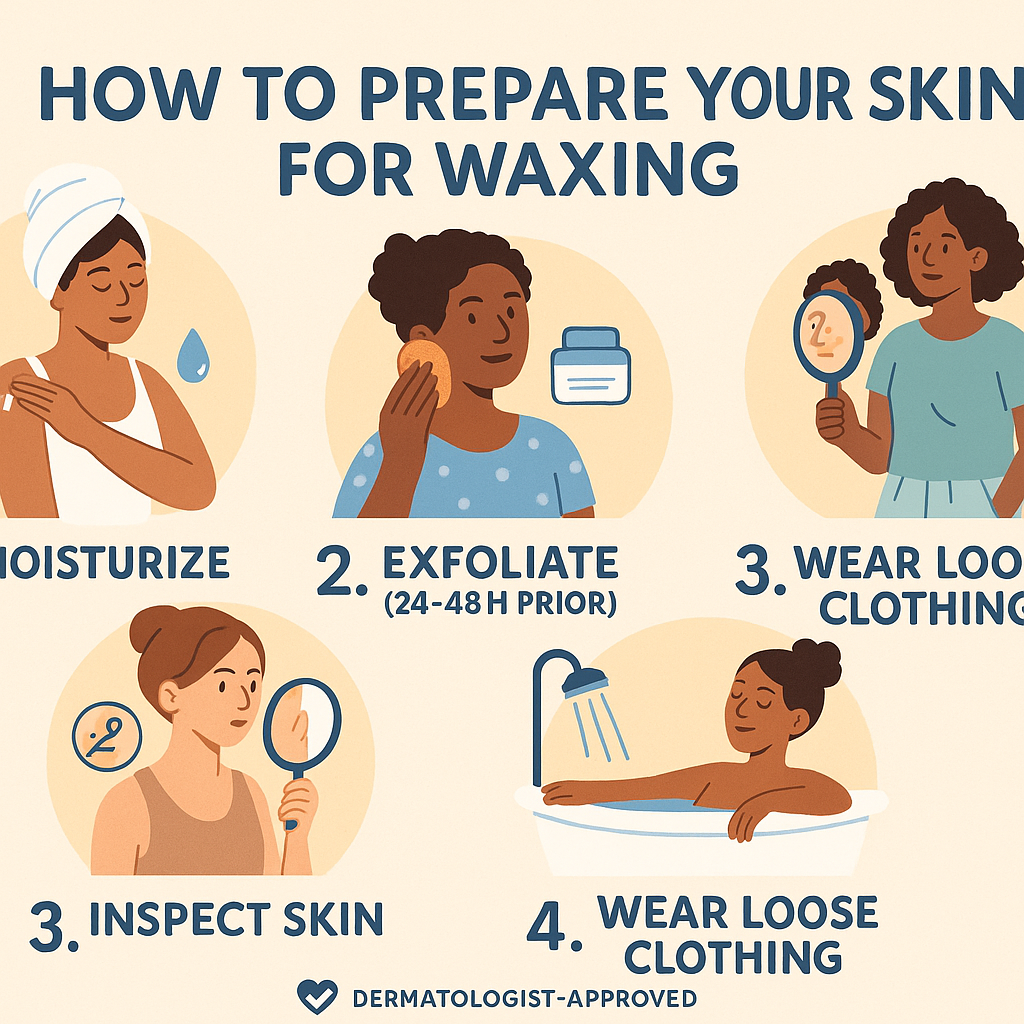How to Prepare Your Skin for Waxing
Booked your first waxing appointment? Breathe. Talk to your esthetician, then follow this simple plan to prepare your skin so the wax grabs hair—not skin.
Moisturize
For smart pre-wax skincare, make hydration a daily habit in the days before your visit. Well-moisturized skin helps the wax release more easily, reducing pain and irritation.
- Use non-comedogenic, fragrance-free, or hypoallergenic lotions with ceramides, hyaluronic acid, or aloe vera to support the skin barrier.
- On the day of your appointment, skip oils and heavy creams—they block wax adhesion.
Pro Tip: Avoid heavy oils (like coconut or mineral oil) before waxing to prevent uneven hair removal.
Exfoliate
Exfoliating 24–48 hours before waxing clears dead skin cells so the wax grips hair follicles, not skin.
- Use a gentle scrub or chemical exfoliant with AHA or BHA (salicylic acid) to unclog pores and prevent ingrown hairs.
- Avoid exfoliating on the same day; let the skin barrier rest to reduce sensitivity.
- For sensitive skin, try a mild enzyme exfoliant or a soft mitt—skip harsh, gritty scrubs.
Bonus Tip: After waxing, wait at least 48 hours before exfoliating again to limit bumps and ingrown hairs.
Give your skin a once over
Check for redness, inflammation, or open wounds. If present, reschedule—waxing over damaged skin risks infection and hyperpigmentation.
Heads-up: Tell your esthetician about moles, skin tags, or beauty marks. They can use a barrier cream or adjust technique.
- Pause retinol / retinoids for 5–7 days pre-wax to prevent tearing or peeling.
- Trying a new wax? Do a patch test first to reduce allergic reactions.
Take a warm bath
On wax day, take a warm bath or shower for 10–15 minutes to open pores, soften hair follicles, and hydrate skin. Avoid scalding water—it boosts skin sensitivity.
- After bathing, pat dry; skip lotions and oils so you don’t block wax adhesion.
- Dust a little talcum powder or cornstarch right before waxing to reduce moisture and help wax grab hair.
Calm factor: Warm water eases muscle tension, which may lower perceived pain.
Wear loose clothing
Post-wax, skin is smooth but sensitive. Wear loose, breathable clothing (like cotton or linen) to reduce friction, heat, and sweat—main triggers for irritation and ingrown hairs.
- Skip tight leggings and synthetic fabrics for 24–48 hours.
- For bikini/Brazilian, choose loose cotton briefs or go without briefly.
- Avoid workouts, saunas, and direct sunlight during the first 24–48 hours to protect the skin barrier.
Bonus: The Hidden Science of Pre-Wax Skin Prep
Waxing temporarily disrupts the skin barrier and lightly exfoliates the epidermis. Good prep lowers microtrauma, supports pH balance, and respects the skin microbiome.
- Exfoliation → removes dead cells → helps prevent ingrown hairs
- Moisturizing → strengthens barrier function → improves wax release
- Retinoids → increase sensitivity → pause pre-wax
- Warm bath → opens pores → lowers pull resistance
Final Thoughts
Waxing doesn’t have to be scary. With smart planning, steady hydration, and gentle exfoliation, you set yourself up for a smooth, low-drama session.
Have questions or sensitive skin? Tell your esthetician about any skin conditions, medications, or products (like retinoids) you use.
FAQs: How to Prepare Your Skin for Waxing
About ¼ inch (grain of rice). This length improves wax adhesion and reduces missed patches.
No. Moisturize up to the night before, but avoid oils and lotions on the day—they can block wax grip.
Yes—24–48 hours prior. Use a gentle scrub or AHA/BHA to remove dead skin and help prevent ingrown hairs.
Pause retinol/retinoids for 5–7 days before waxing to avoid skin tearing and post-wax peeling.
Yes. A warm bath or shower for 10–15 minutes softens hair follicles and can reduce pain.
Loose, breathable clothing like cotton or linen for 24–48 hours to avoid irritation and ingrown hairs.
After 48 hours, exfoliate gently 2–3 times weekly and keep skin hydrated. Avoid friction and tight clothing.
Inform your esthetician so they can protect or avoid them using barrier cream or technique adjustments.

